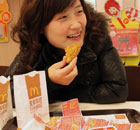Hot on the Web
Majority feel festival lacked true joy: Survey
By Cheng Yingqi (China Daily)
Updated: 2010-02-25 06:58
 |
Large Medium Small |
Eat traditional food with family and friends, post spring couplets and let off firecrackers - that is pretty much what most Chinese do year after year during Spring Festival.
But Spring Festival this year was a little different than the ones before, according to a survey. It "lacked the feeling of joy and festivity".
The China Youth Daily online survey, which attracted 1,625 respondents, showed that 74 percent of those who voted had to "try hard to feel the joy of the festival", with 53.6 percent saying it is estranged relations among people that is diminishing the joyfulness of Spring Festival.
"People are so busy shopping this time of the year that they don't even have time to celebrate the Spring Festival," said Zhang Yi, one of the respondents who spent the festival at home surfing the Internet.
The poll was posted on two popular Chinese websites - www.minyi.net.cn and www.hudong.com.
Four out of five respondents said they had Spring Festival dinner with their families, 70 percent said they dolled up their houses with spring couplets and prints, set off fireworks and visited relatives, and about 64 percent said they ate dumplings.
But traditional practices such as worshipping ancestors and staying up till midnight on New Year's Eve were not as popular.
"I am not suggesting to go beat drums all around town. I'm only seeking the true joy of the festival from the bottom of my heart," an unnamed netizen wrote in an online post titled "Seeking the lost festive feeling", which has received 200,000 hits in just a few days.
Of those who took part in the survey, 69.7 percent defined the festive feeling as "happiness from the bottom of one's heart", for 58.3 percent it meant "best wishes for the coming year", and 44.8 percent believed it to be an "occasion to get together with family".
"The traditions are being forgotten because the ethics in Confucianism are diminishing with time. I'm afraid there will come a day when we will have to look up books to know our traditions," said Jian Biao, a journalist with the China Culture Daily.
But the majority, it seems, is not fretting over traditions. More than half of the respondents said they were more comfortable with the "modern-day festivities".
"I didn't visit my relatives or set off fireworks. I didn't even watch the Spring Festival gala TV show. But that doesn't mean I didn't enjoy myself," said Yang Bo, a college student who spent the holidays on a road trip from Shanghai to Suzhou.
Liu Xicheng, an expert in folk culture and arts, said: "The core of Chinese people's strong sense of affinity lies in our value of family. And Spring Festival is the time to show how much our relatives mean to us."
In his blog, Liu writes that even though the Year of the Tiger comes against the background of globalization, modernization and urbanization, "Chinese culture will retain its famed dynamism and be always blessed with a bright future, in spite of changing traditions."
(China Daily 02/25/2010 page2)







